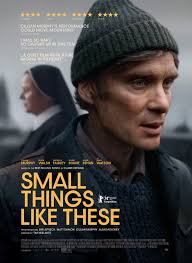
SMALL THINGS LIKE THESE
Ireland, 2024, 95 minutes, Colour.
Cillian Murphy, Eileen Walsh, Zara Devlin, Emily Watson, Michelle Fairlry.
Directed by Tim Mielants.
This film is based on the Booker-prize nominee by Irish novelist, Claire Keegan. Another of her stories, Foster, was filmed as The Quiet Girl, the dialogue in Gaelic. She is a multi-award-winning novelist.
The setting for this film is a town in Ireland, 1985. At the centre is a very serious man, Will, who is a coal deliverer in the town. He is married, a sympathetic wife, played by Eileen Walsh, and household of daughters. He is played by Cillian Murphy, Oscar-winner at this time for Oppenheimer but a veteran of more than 30 years of Irish and international films. Here is a powerful performance but the performance is greatly enhanced by the way that he is photographed throughout the film, so often close-ups, extreme close-ups of his face, the silent body language communicating his experiences, many sad memories, difficulties in the present, dark and brooding.
For an intense film about Ireland, it has been directed by Belgian director, Tim Mielants, who worked with Cillian Murphy directing six episodes of the series, Peaky Blinders, as well as making the intense war film about the German occupation of Antwerp, Wil. Actor and director worked together in their next film, Steve.
There are quite a number of flashbacks to Will and his boyhood, his unmarried mother and their being taken on by a wealthy and kindly widow. Nevertheless, some harsh treatment by the children at school, emphasising his isolation, his self-doubt.
His work is delivering coal, his oldest daughter working with the accounts. His wife is sympathetic, but not always appreciating the depths of his inner thoughts and feelings.
What brings this to a head is the experience of his finding one of the young women who are unmarried and pregnant and committed to the care of nuns in what were called the Magdalenes. She is Sarah and has been locked in the coal room and he discovers her. He brings her out, some confrontations with the nuns, an encounter with the superior, played by Emily Watson. Emily Watson’s Sister Mary embodies those characteristics, many good, many far too severe, of superiors in past times. She is in control, demanding, wanting discipline, actually encouraging a harsh regime, structures, hard work, discipline, the sisters in the convent to exercise this kind of control.
In 2002, Peter Mullan directed The Magdalene Sisters, a strong expose of those times. Small Things like These is a significant companion film.
In his interview with Sister Mary, who knows the family well, she is able to threaten, cajole, control, Will begins to brood even more on the the nuns, the church, unmarried mothers, the fate of the children, his sense of duty, a sense of responsibility.
As the film moves in this direction, Will rescuing Sarah a second time, taking her home, their walking down the corridor of his house to…, the film abruptly stops, surprising the audience in their reflections, emotional responses, which they now have to take out from their film experience to ponder.
- The reputation of the novel by Claire Keegan? The adaptation, short running time, the focus on characters, 1985 and the situations, the flashbacks?
- Ireland, 1985, families, home life, father, mother, the daughters, the small home, the family life? The father and the delivery of the coal?
- Life in the town, the Catholic Church, Christmastime, in the church? The nuns?
- The gradual revelation about the institutions for the Magdalenes, young girls, unmarried mothers, sent by their parents and family, the hardships, the hard work, domestic, laundries, cooking, the pregnancies, the babies? The role of the nuns, the severity, discipline, harsh treatment, Sarah locked in the coal room? The role of the superior, seeing her with the priest, the interview with Will, the awkward situation, her knowledge of him and the family, his daughters and the school, the fees? The money gift for his wife? Her warning him away? Her treatment of Sarah, seemingly benign, the wash, food? Sarah again in the cold room? The film’s judgement on the sisters, the Catholic Church and severity, judgmental on the young women, treatment of them?
- Will as a person, the flashbacks to his past, his mother, the bond with her, the reaction of the other children, their treatment of him, the spit on his coat? His mother cleaning it off? Taken in by Mrs Wilson, Mrs Wilson and her wealth, the household, the kindness to Will and his mother? The effect on Will as he grew up?
- The adult Will as a personality, quiet, brooding, relationship with his wife, the domestic scenes, with his children, the oldest and her accountancy, the interaction with the others, music, the meals, happy times? And the memories of his past? His devotion to his work? Other friends in the town, communication, the visit to the pub?
- The impact of finding Sophie with the coal, having glimpsed her with her parents and her reluctance? Rescuing her, the interview with Sister Mary, Sister Mary and her manipulation of the conversation, affirmation, yet threats, the gift of the money?
- Sarah and her difficulties again, Will and his rescue, bring her to the home, preparing to walk down the corridor, to…?
- The suddenness, abruptness of the ending, the audience processing all that has gone before, anticipation of what is to come, taking this away for reflection after viewing the film?